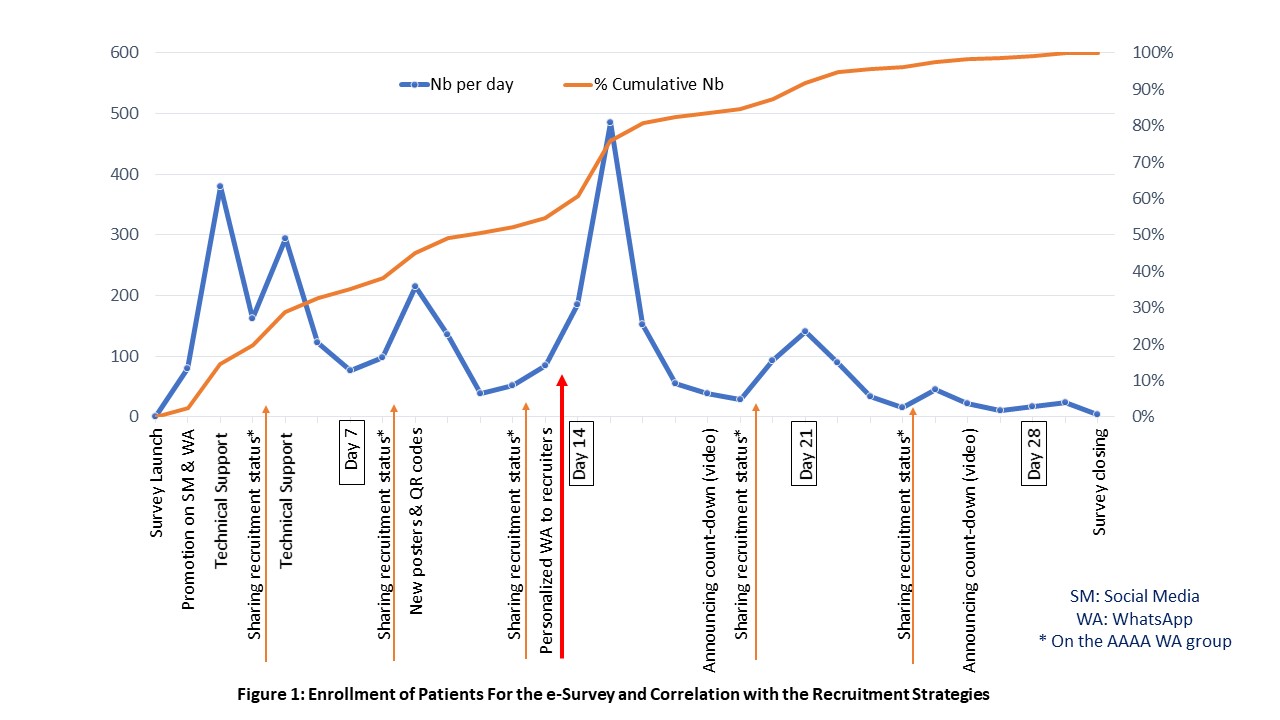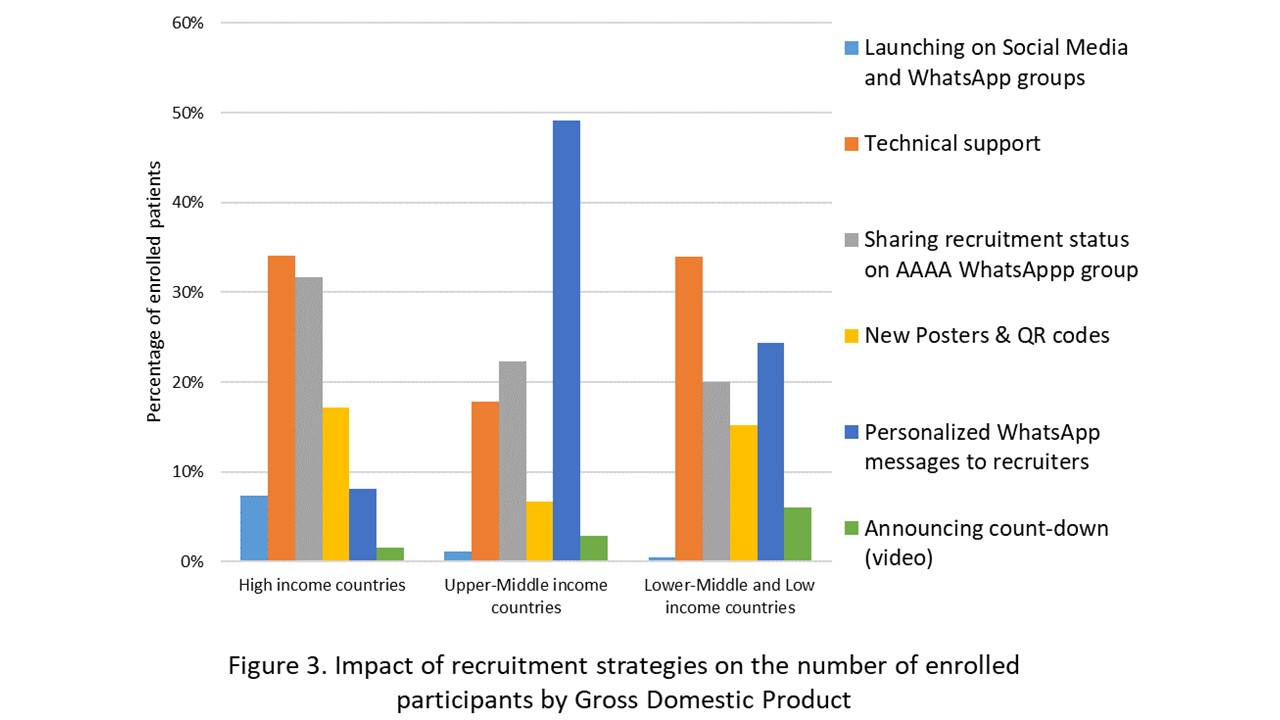Session Information
Date: Monday, November 8, 2021
Title: Epidemiology & Public Health Poster III: Other Rheumatic & Musculoskeletal Diseases (1022–1060)
Session Type: Poster Session C
Session Time: 8:30AM-10:30AM
Background/Purpose: The use of online surveys as a recruitment tool for clinical research has increased during the COVID-19 pandemic and will likely continue to expand. However, good practice guidance for investigators and steering committees to optimize their digital recruitment strategies is still needed. The aim of this study was to identify the most effective strategies for digital recruitment (e-recruitment) in an international Arab online study about the perceptions of patients with rheumatic diseases regarding the COVID-19 vaccination.
Methods: This is a post hoc analysis of the ARCOVAX (Arab League of Associations for Rheumatology (ArLAR) COVID Vaccination) study, which included patients with rheumatic diseases and health care professionals (HCPs, serving as a control group). The ARCOVAX questionnaire was an anonymous web survey adapted from the VAXICOV study (Felten et al. Lancet Rheumatol. 2021 Apr;3(4):e243-e245) and disseminated in Arabic, English, and French from April 13th until May 11th, 2021 by an ArLAR special interest group (Arab Adult Arthritis Awareness (AAAA) group), through multiple social media channels. The steering committee conducted 6 different actions to boost recruitment: promoting on social media and WhatsApp groups, sharing recruitment status on AAAA WhatsApp group, sending personalized WhatsApp messages to recruiters, disseminating e-posters and QR codes, addressing recruiters’ technical issues (technical support), and announcing count-down for survey closing through a promotional video. The impact of each action was correlated with the number of enrolled participants, first in the whole population then by countries stratified according to the Gross Domestic Product (GDP) level as per the World Bank Classification.
Results: A total of 3,176 participants from 19 Arab countries completed the survey (1,594 patients and 1,517 HCPs). The enrollment of participants was highly fluctuating (Figure 1) and the e-recruitment strategies had different impacts: 31% of participants were recruited after sending personalized WhatsApp messages to recruiters in different countries, 28% after prompt technical support by the steering committee to resolve issues faced by the recruiters, 24% after sharing recruitment status on AAAA WhatsApp group, 12% after disseminating e-posters and QR codes via social media and WhatsApp groups, 3% after initially launching on social media and WhatsApp groups and 2% after sharing a motivational video announcing the count-down of the last week of recruitment (Figure 2). The impact of these strategies was different according to the countries’ GDP level, where technical support and sharing recruitment status had the most impact in high-income countries, and personalized messages resulted in higher recruitment in the upper-middle-income countries (Figure 3).
Conclusion: The most effective strategy was the use of personalized WhatsApp messages to the recruiters. The research team must be active (mobilizing teams to participate), reactive (prompt technical support), and proactive (sharing updates regularly). Further studies are needed to identify the appropriate action for each phase of e-recruitment and for each specific region.
 Figure 1: Enrollment of Patients For the e-Survey and Correlation with the Recruitment Strategies
Figure 1: Enrollment of Patients For the e-Survey and Correlation with the Recruitment Strategies
 Figure 2. Percentage of recruited participants with regards to the strategy
Figure 2. Percentage of recruited participants with regards to the strategy
 Figure 3. Impact of recruitment strategies on the number of enrolled participants by Gross Domestic Product
Figure 3. Impact of recruitment strategies on the number of enrolled participants by Gross Domestic Product
To cite this abstract in AMA style:
Hmamouchi I, El Kibbi L, Abdulateef N, Masri B, Halabi H, Eissa M, El Rakawi M, Abutiban F, Hamdi W, Metawee M, Abi Najm A, Adnan A, Felten R, Arnaud L, Ziade N. How to Optimize E-Recruitment Strategies: Lessons Learned from over 3000 Participants in an International Arab Online Study [abstract]. Arthritis Rheumatol. 2021; 73 (suppl 9). https://acrabstracts.org/abstract/how-to-optimize-e-recruitment-strategies-lessons-learned-from-over-3000-participants-in-an-international-arab-online-study/. Accessed .« Back to ACR Convergence 2021
ACR Meeting Abstracts - https://acrabstracts.org/abstract/how-to-optimize-e-recruitment-strategies-lessons-learned-from-over-3000-participants-in-an-international-arab-online-study/
